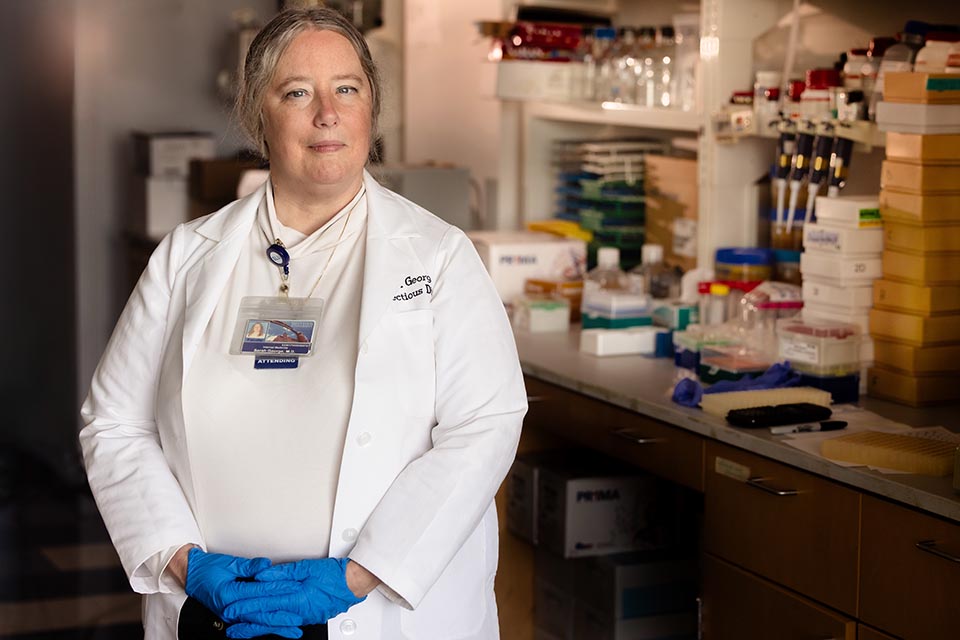SLU Vaccine Center Will Enroll Healthy Volunteers in Yellow Fever Vaccine Clinical Trial
Researchers will study a vaccine for the potentially deadly tropical disease
ST. LOUIS – Saint Louis University’s Center for Vaccine Development will enroll up to 70 adult volunteers in a clinical trial to study the safety elicited by a new investigational vaccine for yellow fever, a potentially deadly disease that is spread by mosquitoes. The research is funded by Sanofi Pasteur.
Because of recent outbreaks of yellow fever in Africa and South America, Sanofi is developing a new yellow fever vaccine. A new vaccine is needed because the current vaccine is not safe in people with egg allergies and because the Aedes mosquitoes, which transmit the disease, are spreading rapidly, according to Sarah George, M.D., professor of infectious diseases at SLU and principal investigator for the clinical trial. Yellow fever vaccination is required for travelers and military personnel going to countries where the yellow fever virus is present.
About 600 million doses of the current licensed vaccine have been given, providing immunity to yellow fever for life, George said.
SLU will study whether a new type of yellow fever vaccine, which is made without using eggs or animal products, is safe in volunteers who are given the investigational vaccine or the current yellow fever vaccine. The new type of vaccine has already been studied in 850 adults aged from18 to 60 years. No concerns of safety were reported, and a protective response against yellow fever was observed in almost all investigational vaccine recipients.
Endemic in Africa and South America, yellow fever annually infects about 200,000 people, causing symptoms that include fever, back pain, headache, nausea, vomiting, fatigue and weakness. Most people recover but about 15 percent of those infected become severely ill with jaundice, bleeding and shock. Of those who develop severe disease, between 20 and 50 percent are at risk of death, with as many as 60,000 people dying each year.
“Yellow fever can be a severe disease and can kill you,” George said. “It has caused several outbreaks in the tropics in past years, and we need a vaccine which is easier and faster to make than the current vaccine.”
Study investigators will enroll healthy adult volunteers between the ages of 18 and 60 in the clinical trial. Researchers will study the safety and effectiveness of a single dose of the investigational yellow fever vaccine in 850 adults nationwide at multiple sites in the U.S. Participants will be randomly assigned to receive the investigational or the licensed yellow fever vaccine. The study will last around 6 months and will require a number of visits and phone calls. Study participants will be compensated for their time and participation in the study.
Interested participants should contact the Saint Louis University Center for Vaccine Development at:
- Email: vaccine@slu.edu
- Telephone: 314-977-6333
For more information about the trial, visit ClinicalTrials.gov. The study’s Clinical Trials Identifier is NCT07002060. The study is funded by Sanofi.
Saint Louis University Center for Vaccine Development
Saint Louis University has been on the front lines in the fight against pandemics and global health crises for more than three decades and first received federal funding for vaccine research in 1989. Led by Daniel Hoft, M.D., Ph.D., SLU’s Center for Vaccine Development is one of only 10 institutions selected by the National Institutes of Health as a Vaccine and Treatment Evaluation Unit (VTEU). As a VTEU, the Center helps develop and evaluate vaccines that will protect people from infectious diseases and emerging threats. It conducts Phase 1 through 4 vaccine and treatment trials, including clinical studies in collaboration with industry partners.
Saint Louis University School of Medicine
Established in 1836, Saint Louis University School of Medicine has the distinction of awarding the first medical degree west of the Mississippi River. The school educates physicians and biomedical scientists, conducts medical research, and provides health care on a local, national and international level. Research at the school seeks new cures and treatments in five key areas: infectious disease, liver disease, cancer, heart/lung disease, and aging and brain disorders.


















